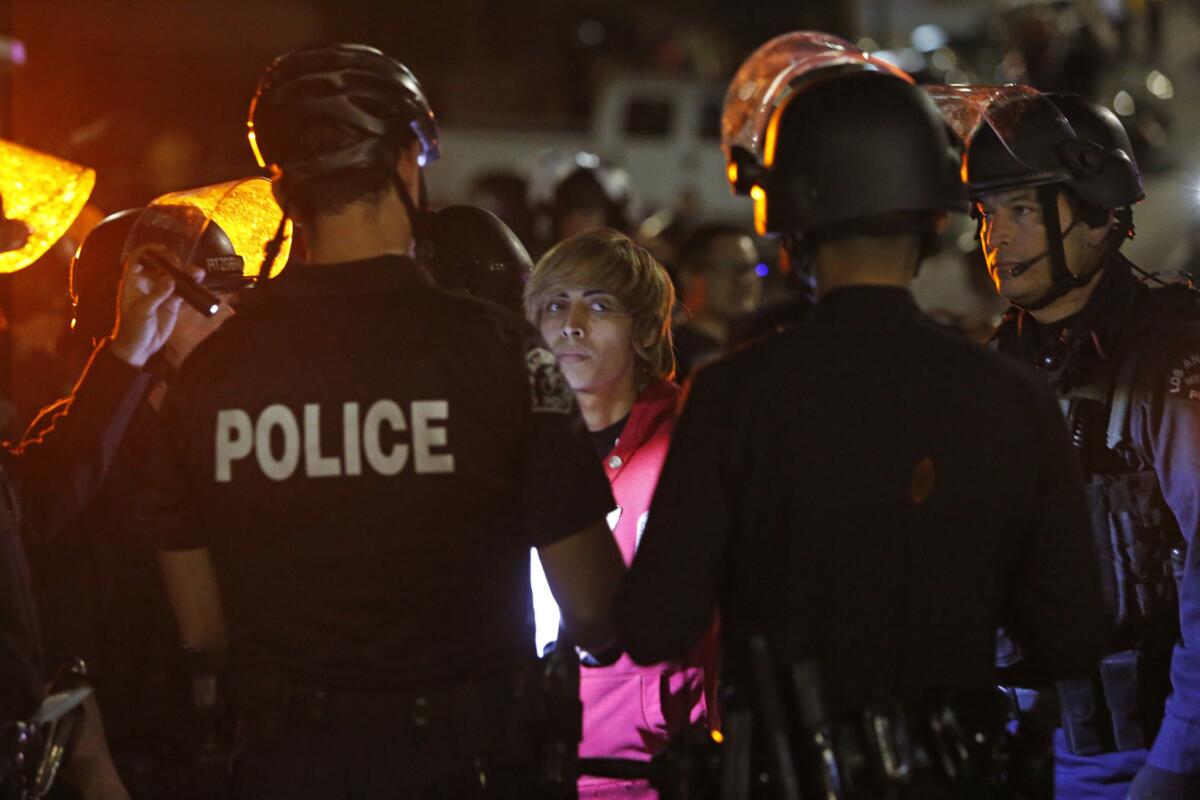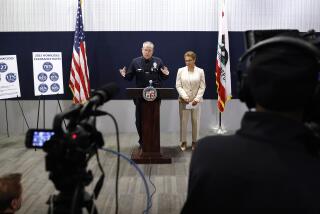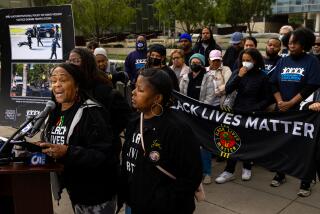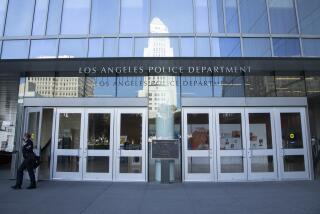Class-action suit accuses city and LAPD of violating protesters’ rights

Individuals arrested in Los Angeles while protesting the killing of a black man in Ferguson, Mo., have filed a class-action lawsuit accusing the city and police of violating their constitutional rights.
The federal lawsuit filed Tuesday alleges that in November 2014, the Los Angeles Police Department surrounded several hundred protesters as they marched downtown and in the Westlake district. Police then arrested or detained and questioned dozens of individuals without lawful dispersal orders, the suit says.
One of the protests occurred Nov. 26 at Sixth and Hope streets and involved about 130 protesters. Two days later, about 40 protesters were detained and questioned at Beverly and Alvarado streets, the suit says. Other demonstrations also resulted in arrests and detentions.
The suit, filed on behalf of protesters by the National Lawyers Guild Los Angeles, alleges that police corralled, “detained, interrogated” protesters and that the demonstrators were “forced to give up personal information.”
Protesters were told they were detained for blocking traffic, according to the lawsuit.
The Los Angeles protests were among dozens around the country after the shooting death of 18-year-old Michael Brown in Ferguson, Mo., and the subsequent decision by a grand jury not to indict the white police officer involved. Most of those protests resulted in few arrests. But more than 323 protesters were arrested over several days in Los Angeles. Only about 9% of those arrested had been charged by last summer, according to a Times review.
The class-action suit, which names police Chief Charlie Beck and other high-ranking officers, alleges the LAPD gave dispersal orders at one location, but arrested protesters at another location who had not heard the order or warnings that they could be arrested.
The suit accuses the LAPD of violating the 1st, 4th and 14th Amendment rights of the protesters. Most of the plaintiffs, according to the suit, were held for about 14 hours and not allowed release on their own recognizance, which is typically granted. Beck, however, eventually ordered their release because of the Thanksgiving holiday.
Carol Sobel, a veteran civil rights lawyer and one the attorneys who filed the suit, said the city and police have failed to curtail alleged rights violations that have resulted in large damage awards to plaintiffs involved in past protests.
Those settlements include a $5-million award to protesters arrested during the 2000 Democratic National Convention, nearly $13 million awarded to those arrested during a 2007 May Day protest, and $2.45 million awarded to protesters arrested during Occupy L.A. sit-ins in 2012.
“They don’t learn from the mistakes of the past,” Sobel said.
Sobel said that as part of the 2000 and 2007 settlements the LAPD agreed to provide officers better training on the rights of protesters, but has failed to do so. During the 2007 May Day rally, officers swung batons and fired rubber bullets on a mostly peaceful crowd, injuring 250 people.
An LAPD spokesman, Capt. Andrew Neiman, declined to comment on the latest lawsuit, citing the ongoing litigation.
Police have previously defended their actions during the Ferguson-related protests. The objective was to allow protesters to exercise their 1st Amendment rights, but concerns over public safety led to police action, said LAPD Capt. Jeff Bert, who oversaw the on-the-ground response.
Bert said he delivered dispersal orders but acknowledged that the chaotic circumstances posed challenges, particularly during the first night of demonstrations.
On Nov. 26, protesters initially gathered outside the federal courthouse in downtown Los Angeles but moved to 7th and Figueroa streets, where police said they ordered the crowd to disperse.
But many protesters and others say they never heard such an order. The lawsuit alleges that the crowd was allowed to move to 6th and Hope streets where they and other demonstrators were detained. Charmaine Chua, a plaintiff in the lawsuit, said she asked to leave and police refused. About 130 arrests were made, including people there who were not protesting, the suit alleges.
Two nights later, protesters marched to 8th and Alvarado and about 40 protesters were penned by riot-clad officers. An order to disperse was given about an hour later and protesters were informed they would be individually questioned. Those protesters weren’t arrested, but they say they were handcuffed, searched, videotaped and questioned about their identities before they were allowed to leave.
Twitter: @lacrimes
More to Read
Sign up for Essential California
The most important California stories and recommendations in your inbox every morning.
You may occasionally receive promotional content from the Los Angeles Times.











